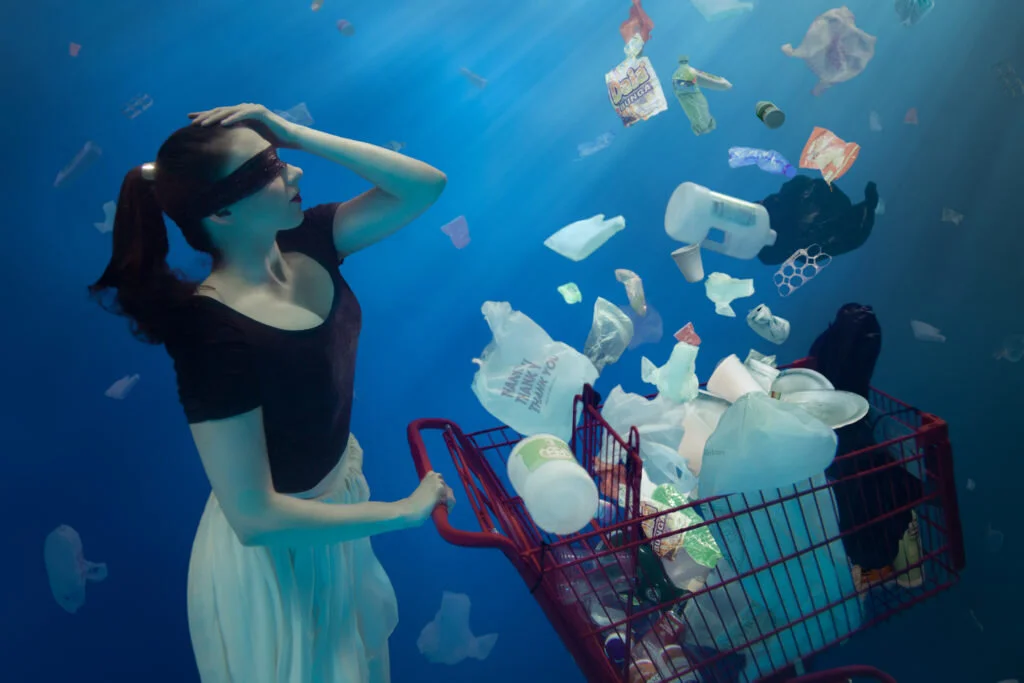Underwater photography and films advocate for ocean conservation
By Erica Cirino, Safina Center Launchpad Fellow
Blind Spots. Photo: Brett Stanley
Documentary filmmaker Christine Ren has a unique set of experiences and skills: she has degrees in marine affairs/policy and biology, worked as a ballet dancer and is an experienced diver. When she decided to combine these personal attributes to make art advancing ocean conservation efforts, she ended up with some intriguing results.
To date Ren has created two films, one about overfishing called “Jellyfish Soup” and one about plastic pollution called “Blind Spots,” with a third film about coral bleaching called “The Red Road.” Photographs accompany the films. To create these works, a fully costumed Ren dances underwater, with various props, depending on the film’s subject matter and photographers shoot her.
Organizing costumes, ideas and props, as well as gathering teams of photographers and assistants and securing shooting locations takes months, says Ren. When she finally gets underwater for her shoot, the hard work really begins: Ren must dive to 10 feet below sea level and pose herself in the water—ensuring her hair, facial emotions and body posture are correct for hours, taking sips of oxygen from support divers and coming to the water’s surface every so often.
Her photographers, outfitted in diving gear, are forced to cope with the challenges of shooting underwater. The biggest challenge, says Ren, is that everything is in constant motion underwater—it’s hard to compose everything just right.
Despite the challenges, Ren’s team has been able to produce a suite of awe-inspiring works. In Jellyfish Soup, for instance, she dances in a shimmering green costume among hanging hooks and artificial jellyfish. In Blind Spots, she pushes a shopping cart filled with plastic trash through the water. Ren shares her films and photographs online in an effort to start conversations about ocean issues.
“I believe this is how we create new conservation behaviors,” says Ren, who is based in San Francisco, California. “They require social support, encouragement online from others on the same journey, and small daily changes to instill new habits.”
Prospects for the oceans are grim, particularly when it comes to overfishing, plastic pollution and coral bleaching: Last year scientists learned overfishing is causing global catches of fish to fall three times faster than had been estimated to occur. By 2050 scientists predict the oceans will be filled with more plastic than fish, by weight. In 2015 NOAA declared the world’s third global coral bleaching event.
While there are many conservation campaigns focused on addressing these and other ocean issues, unlike many other efforts, Ren’s work is not currently tied to fundraising or signing petitions. Instead, she encourages the people who view and share her films to take on “30 Day Challenges” that help further ocean conservation, such as going completely plastic free or purchasing only sustainable seafood for 30 days.
Jellyfish Soup highlights the issue of overfishing. Photo: Brett Stanley
While signing petitions and donating money can be helpful in furthering conservation efforts, Ren says small actions are also very important for making positive change.
“I want us all to remember that the smallest stone sends its ripples to the edge and that true lasting change starts within each of us,” says Ren. “The fate of the world is in our hands, and we get to choose in each moment of every day which way we tip that scale.”
In the future, Ren says she hopes to illuminate other ocean issues. She’s currently pushing forward a Kickstarter campaign to raise funds for this purpose. Check out Ren’s work and become a part of her 30 Day Challenges by engaging with her, online:
http://instagram.com/christinerenfilmmaker


